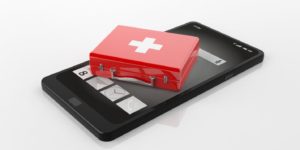When we get sick or have a medical emergency and our primary care physician is not available, we are left with a few alternative options. We might visit an urgent care facility for less serious situations, like a chest cold or a minor cut requiring stitches, as these facilities are normally open later in the evening.
If it is after 8 p.m. at night or the weekend, then our options narrow, and we are left with visiting either a 24-hour emergency room (ER) at a hospital or an emergency care center. No matter what type of healthcare facility we choose to visit, there are some essential items you will want to bring along with you, as follows:
- Some form of photo identification. You need to prove you are who you say you are. A driver’s license, military ID, state-issued ID, library card, or student ID is fine, as long as it has your picture and name on it. For minors, their parents or guardians must have an ID.
- A list of any current medications taken on a daily or regular basis. This list should include both prescription and over-the-counter medications. You will also want to write down the dosage amount and how often it is taken.
- Any current illnesses or diseases. If you have already been diagnosed with an illness or disease, you will need to inform the ER staff so they can provide proper care.
- A list of any known allergies. If you are allergic to medicines, food, insect bites, or other things, you will want to have it written down ahead of time.
- How you treat allergic reactions. Write down what methods you use to treat various allergic reactions, such as using an EpiPen® or taking an antihistamine.
- A list of any medical risks and prior surgeries. If you have an increased risk of heart disease, stroke, or cancer due to your family history, make sure to write it down. You will also want to record the date of any prior surgeries and why you had them.
- A list of your primary care providers and phone numbers. Make a list of all doctors and healthcare providers you see for various types of care and treatment. If you have a family, write the name of the family member next to the provider name.
- Health insurance cards and contact information. You will want to make sure you bring your most current insurance card along. The card will have valuable information like your policy number, group number, and contact details.
- A list of any emergency contacts. This list could include friends, relatives, religious and spiritual advisors, work supervisors or a human resources contact, and so on.
- Copies of any relevant legal documents. You want a copy of your DNR (Do Not Resuscitate), organ donor, healthcare proxies, and other such legal documents that could be vital in regards to your care and treatment during an emergency.
Why Do You Need to Keep This Information Handy?
The reason you want to keep this information easily accessible is that you never know when an emergency medical condition will occur. You could wake up in the middle of the night to discover your child has a high temperature and earache. Rather than thinking about what you need to bring along to the emergency care center or hospital ER, you will be more focused on getting your child medical care.
By putting together the above information you will need when you visit an ER or emergency care center ahead of time, you will have it readily available. It is a good idea to keep everything in a handy emergency center preparedness kit. Most of the items on this list are easy to complete by simply writing the information down on a piece of paper.
For your photo ID, make a copy of your driver’s license or another ID and put it into your kit. This way, if you forget your actual photo ID during an emergency, you will at least have a copy in the kit, which most emergency healthcare providers will accept.
For your insurance card, contact your insurance provider and ask for an extra card to put in your kit. Most healthcare providers are going to need to see the physical health insurance card, not a photocopy of one.
It is also a good idea to review and update the information in your ER preparedness kit at least once a year, to verify everything is still correct and accurate. If, at any point during the year, there are any major changes, take the time to update the information in your kit. For instance, you may have given birth to a new baby or started a new long-term maintenance medication.
- TIP: Use your smartphone to take pictures of all of your documents in your kit and store them in their own file folder. This way, if you forget the kit, you will have a digital backup easily accessible.

Reasons to Go to an Emergency Center vs. a Hospital ER
Both facilities are capable of treating a variety of medical conditions, from illnesses and diseases to cuts, burns, and heart attack symptoms. However, there are several benefits of going to an emergency center compared to a hospital ER.
- Wait Times
The wait times at a hospital ER can be much longer. This is because the hospital places a priority on the order patients are seen. If you have a sprain, compared to another patient who has a deep cut and is bleeding, you will be ranked a lower priority. In addition, if ambulances bring in patients with life-threatening conditions after you have already been waiting, they will receive higher priority.
Emergency care centers tend to see patients fairly quickly, regardless of the type of medical problem that brought them in. Rather than waiting for hours to be seen, your wait times to be seen could be as short as five minutes or less.
- Number of Examination Rooms
Hospital ERs have a set number of exam rooms/beds. Once these are filled, you have to wait until a room or bed is available. At an emergency care center, there tend to be more exam rooms and exam areas.
- Number of Healthcare Providers
Depending on the size of the hospital, there might only be one doctor seeing patients in the ER. There can also be a limited number of nurses on duty, too. Furthermore, if you need x-rays or lab work, you have to wait for the medical technician. In some cases, the technicians will be “on call,” meaning they have to drive to the ER and make preparations to take the x-ray or collect samples for the required lab work.
At an emergency care center, there are doctors, nurses, and other healthcare providers capable of examining patients and making diagnoses. In addition, collecting samples or taking an x-ray is much faster because the staff required to perform these duties is also on hand.

What Does an Emergency Center Treat?
24 hours emergency care centers treat a variety of conditions, including:
- Burns
- Cuts
- Allergic Reactions
- Fractures
- Broken Bones
- Back Pain
- Sports Injuries
- Concussions
- Sprains
- Insect Bites
- Heart Attacks
- Chest Pain
- Stroke
- Congestive Heart Failure
- Asthma
- Hypertension (High Blood Pressure)
- Seizures
- Dislocations
- Abdominal Pain
- Cold and Flu
- Sinus Infections
- Skin Rashes
- Bronchitis
- Pneumonia
- Headaches
- Migraines
- Vomiting
- Diarrhea
- Blood Clots
- Serious Infections
Additionally, they offer imaging and lab services when required to diagnose medical conditions, such as x-rays, CAT scans, ultrasounds, and lab tests of collected samples.
- NOTE: It is important to keep in mind that an emergency care center is not the same as visiting an urgent care facility. An emergency care center offers many of the same services as you would receive from a hospital ER.
An urgent care facility is more limited to non-life threatening conditions, diseases, and illnesses. Furthermore, if you are already experiencing a life-threatening condition, it is best to call 911 and be transported directly to a hospital ER for care and treatment.
If you want to avoid long wait times and be seen fairly quickly, then visit an emergency care center like ours, at Exceptional Emergency Center. We are a fully staffed emergency and trauma center with several locations throughout Texas.

We can keep patients under observation for up to 23 hours and, if necessary, transfer them to the appropriate local hospital. In addition, if surgery or other specialized care is required, we handle all the arrangements needed for the transfer and even recommend which local hospital would be best suited to accommodate the patient’s needs.
The next time you have an unexpected medical emergency, we invite you to visit your nearest Exceptional Emergency Center. You may also contact our 24-hour emergency care locations by calling them directly, as follows:
- Harlingen: 956-567-0371
- Livingston: 936-327-7000
- Sachse: 469-202-8658
- East Chase: 817-566-0285
Please feel free to check back often, as we are constantly expanding and opening new locations.
